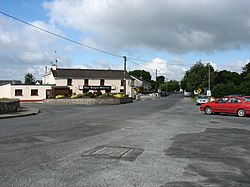Knockananna
Irish: Cnoc an Eanaigh | |
|---|---|
Village | |
 Centre of Knockananna | |
| Coordinates: 52°52′26″N 6°29′35″W / 52.874000°N 6.493000°W | |
| Country | Ireland |
| Province | Leinster |
| County | County Wicklow |
| Elevation | 205 m (673 ft) |
| Population | 143 |
| Irish Grid Reference | T010814 |
Knockananna (Irish: Cnoc an Eanaigh, meaning 'hill of the marsh')[2] is a village in County Wicklow, Ireland. After Roundwood, it is the second-highest village in Ireland.[3]
Toponymy
[edit]In Liam Price's extensive survey of place names of County Wicklow his earliest record of Knockananna is dated 1714 using the current spelling. A 1715 record uses Knockannana. The Straughan family deeds use a different spelling; Knockinana in 1717. Finally the village name shown in A.R. Neville's Map of County Wicklow from circa 1810 is Knockanana.[4] An grave accent has been added in the 1989 Gazetteer of Ireland making Knockànanna to provide a guide to proper stressing in pronouncing the name correctly.[5] Price mentions two local names: Boorawn being derived from baudrán a basket covered in cow-hide and Kish, from ceis the name of part of the bog.[4]
Geography
[edit]Knockananna lies close to the border between County Wicklow and County Carlow. The village is the centre of a dispersed farming area, 2 km to the north-west of Moyne and the Wicklow Way.[6]
People
[edit]During the late 18th century and early 19th century a priest by the name of Fr. John Blanchfield (Blanchvelle) was active in Knockananna and Hacketstown.[3] He was interred in the old church in Knockananna.[7] The old church was renamed the Blanchelle Centre in his honour.[8][9] The village is served by the Church of the Immaculate Conception which was built in 1978.[3]
Colonel Commandant Tom Kehoe (Free State Forces) was born in the area in 1899. He was a member of Michael Collins's assassination Squad, which killed a number of British agents on 21 November 1920.[10] Kehoe himself died from severe wounds he received while attempting to remove a booby trapped land mine during the civil war in Macroom in September 1922.[11]
Irish singer and songwriter Órla Fallon was born in Knockananna in 1974.[12]
In early 2020 at the start of the COVID-19 Pandemic until 2022 after her son Shane had committed suicide, the singer Sinéad O'Connor lived in Knockananna.[13]
Services
[edit]
There is a grocery shop and a pub in the village.[6] The village has a GAA team and the club colours are red and white.[14]
The village was served by a post office from at least 1927, under Ballinglen[15] until its closure on 5 March 2010.[16] The Knockananna post office came under the auspices of Arklow from 1964 until it was closed.[17]
References
[edit]- ^ "Sapmap Area: Settlements Knockananna". Census 2016. Central Statistics Office. Retrieved 21 October 2021.
- ^ "Cnoc an Eanaigh/Knockananna". Placenames Database of Ireland (logainm.ie). Retrieved 20 October 2021.
- ^ a b c "Church of the Immaculate Conception, Knockananna". Hacketstown Parish. Retrieved 21 July 2023.
- ^ a b Price, Liam (1946). The Place-names of Co. Wicklow: The Barony of Ballinacor South, Volume 2. Dublin: Dublin Institute for Advanced Studies. p. 99. ISBN 0901282359.
- ^ Gazetteer of Ireland. Dublin: Placenames Branch of the Ordnance Survey. 1989. p. 241. ISBN 0-7076-0076-6.
- ^ a b "Knockananna (village)". Trailhead Ireland. wicklowway.com. 2023. Retrieved 8 August 2023.
- ^ Kirwan, John (1997). "The Walsh family of Lower Grange, Goresbridge, County Kilkenny" (PDF). The Old Kilkenny Review. Kilkenny Archaeological Society: 89–106.
- ^ "A Story". dúchas.ie. Retrieved 24 March 2023.
- ^ "Blanchelle Centre, KNOCKANANNA, Knockananna, WICKLOW". National Inventory of Architectural Heritage. Retrieved 21 July 2023.
- ^ Coutney, Shay (14 December 2020). "Tom Keogh of Knockananna: His role in Bloody Sunday 1920". Our Wicklow Heritage. Retrieved 21 July 2023.
- ^ MacRaghnaill, Eoin (19 October 2022). "Knockananna community celebrates centenary of Colonel Tom Kehoe". Wicklow People. Retrieved 21 July 2023.
- ^ Farragher, Mike (1 April 2011). "Knockananna's Celtic Woman Orla is Proud of Her Roots". Irish Central. Retrieved 9 August 2023.
- ^ Specia, Megan (27 July 2023). "The Tiny Irish Village Where Sinéad O'Connor Escaped the World". The New York Times. Retrieved 29 July 2023.
- ^ "Knockananna GAA". Wicklow GAA. Retrieved 21 July 2023.
- ^ Frank, Harald; Stange, Klaus (29 September 1990). Irish Post Offices and their postmarks 1600-1990. Munich: Forchumgs- und Arbeitsgemeinschaft Irland e.V. p. 298.
- ^ Schollmayer, Manfred (Summer 2016). "Post Office Closures 1990–214". Die Harfe. 34 (135). Munich: Forchumgs- und Arbeitsgemeinschaft Irland e.V.: 49. ISSN 0948-2172.
- ^ Eolaí an Phoist - Post Office Guide: Vol 1. Dublin: Government Publications Office. 1964. p. 218.
External links
[edit]

